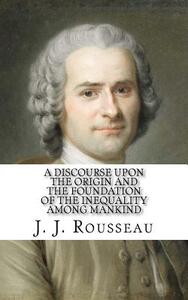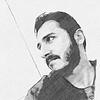You need to sign in or sign up before continuing.
Take a photo of a barcode or cover
143 reviews for:
A Discourse Upon the Origin and the Foundation of the Inequality Among Mankind
Jean-Jacques Rousseau
143 reviews for:
A Discourse Upon the Origin and the Foundation of the Inequality Among Mankind
Jean-Jacques Rousseau
Okay this is pretty boring but occasionally laugh out loud funny. What a ride.
challenging
informative
reflective
slow-paced
Damn, Rousseau. Too relevant for me to handle...wonder what he would have to say about the Trump presidency/administration.
"We could see the multitude oppressed from within as a consequence of the very precautions taken against external threats; we could see a constant increase in oppression without the oppressed ever being in a position to know where it would end, or what legitimate means they had for halting it. We could see the rights of citizens and the freedom of nations gradually extinguished, and the protests of the weak treated as the mutterings of sedition. We could see politics restrict the honour of defending the common cause to a venal segment of the populace; we could consequently see the necessity of taxation arise and the disheartened farmer quitting his fields even in peace time, and forsaking his plough to gird on the sword. We would see bizarre and deadly codes of honor arise."
"...we would see leaders stirring up everything that might weaken assemblies of men by disuniting them, everything that might give society an air of seeming concord and sow in the seeds of real disunity, everything that might inspire distrust and mutual hatred in different social orders through conflict between their rights and their interests, and by these means, strengthen the power that curbs them all."
"We could see the multitude oppressed from within as a consequence of the very precautions taken against external threats; we could see a constant increase in oppression without the oppressed ever being in a position to know where it would end, or what legitimate means they had for halting it. We could see the rights of citizens and the freedom of nations gradually extinguished, and the protests of the weak treated as the mutterings of sedition. We could see politics restrict the honour of defending the common cause to a venal segment of the populace; we could consequently see the necessity of taxation arise and the disheartened farmer quitting his fields even in peace time, and forsaking his plough to gird on the sword. We would see bizarre and deadly codes of honor arise."
"...we would see leaders stirring up everything that might weaken assemblies of men by disuniting them, everything that might give society an air of seeming concord and sow in the seeds of real disunity, everything that might inspire distrust and mutual hatred in different social orders through conflict between their rights and their interests, and by these means, strengthen the power that curbs them all."
Rousseau chronicles the history of mankind from its savage beginnings to its somewhat less savage ideal epoch to its contemporary civilized-yet-miserable societies. While definitely more believable and less wacko than Vico's New Science, slightly more flawed when compared with Kant's Idea of a Universal History. But still a good theory of how mankind came to have inequality (which, at least according to Rousseau, is not its natural state).
This book was written centuries ago and it's interesting how the points it makes are still applicable to some extent to our modern world. It kind of solidifies beliefs I already had about society as a whole. The whole social game is a curse disguised as a blessing and our intelligence as human beings, although brings a lot of benefits, also creates unnecessary suffering. A lot of people in power are sadistic egomaniacs. A new idea he introduced is his belief that selfishness and cruelty aren't truly innate and that the savage man has no need for such instincts and that it was artificially instilled with the creation of advanced society. This does make sense to me. He also described that strong romantic love between two people and that of mother and child as artificial additions by society as well, his logic being that the savage man had no need for all of that, which also made negative sentiments like jealousy and possessiveness useless. I find myself agreeing with that too. I won't give this book a rating because I didn't spend too much time delving deep into it to give it a fair one and I read it quickly after more than 2 months of abandoning it because I was interested in the main points it was conveying.
Rousseau made really good points that are still relevant today, but I feel that he could have done it more concisely.
The only thing holding this back from being 5 stars is that it's catastrophically wrong about a lot of straight up anthropological facts. But he tried really hard. And said some very pretty words.
Rousseau's view of the natural man is the original state of Frankenstein's daemon. Solitary, physically strong, living to pursue simple pleasures that are necessary to sustain life and a lack of insight into the future. The two governing principles of the natural man is the desire for self-sustenance and discomfort on the suffering of other sentient beings.
While I do believe the two principles govern our psyche to a great extent, Rousseau makes an error at the very beginning of the formulation of his natural man. Man was never solitary. Aristotle hit the bullseye when we claimed 'Man is a social animal'. Being social is ingrained in the essence of humans. But while the groundworks of this discourse are flawed, it still is a worthwhile read. For instance, Rousseau declaring metallurgy, and agriculture as the beginning of inequality are quite plausible, and the importance he set on the role of language on our epistemology is quite good. Like for instance, the idea of nothingness couldn't have been grasped by us without language. Nothingness isn't something we can imagine, yet when we say nothingness we can grasp the idea. Also, some of the political ideas he expounds on are worth noting. That's all I have to say about this book.
While I do believe the two principles govern our psyche to a great extent, Rousseau makes an error at the very beginning of the formulation of his natural man. Man was never solitary. Aristotle hit the bullseye when we claimed 'Man is a social animal'. Being social is ingrained in the essence of humans. But while the groundworks of this discourse are flawed, it still is a worthwhile read. For instance, Rousseau declaring metallurgy, and agriculture as the beginning of inequality are quite plausible, and the importance he set on the role of language on our epistemology is quite good. Like for instance, the idea of nothingness couldn't have been grasped by us without language. Nothingness isn't something we can imagine, yet when we say nothingness we can grasp the idea. Also, some of the political ideas he expounds on are worth noting. That's all I have to say about this book.




